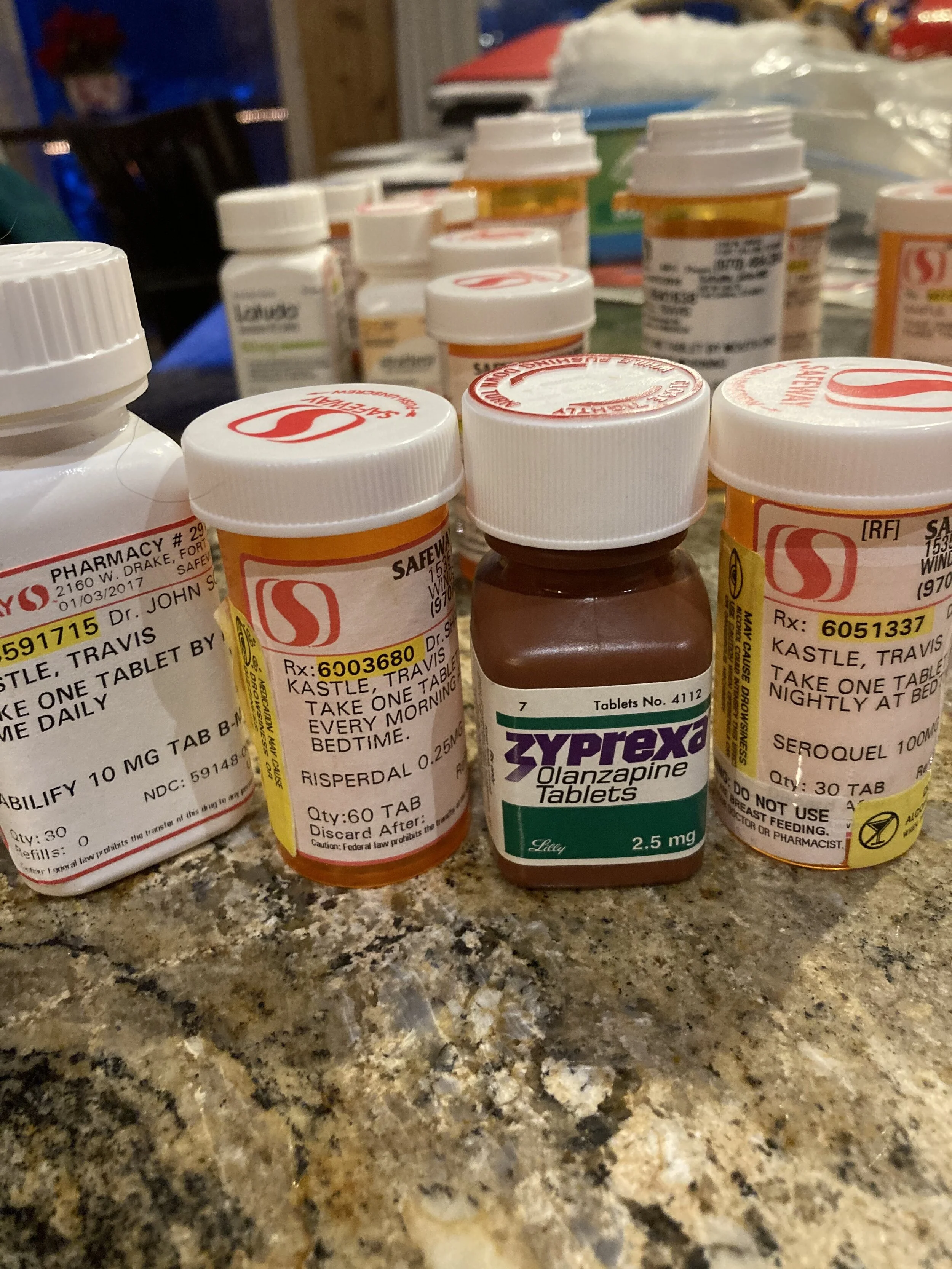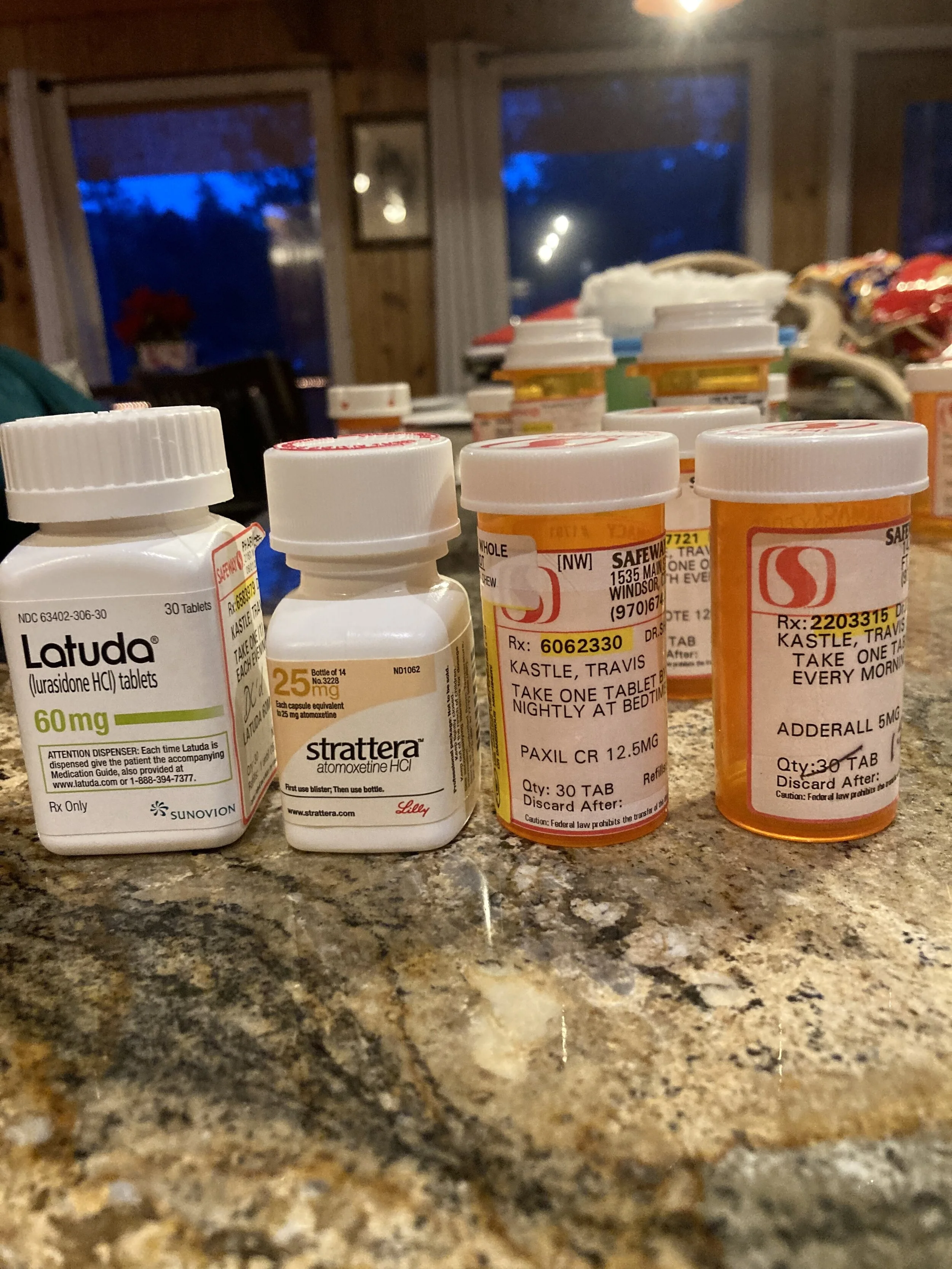Walk a Mile in My Shoes
There is no doubt in my mind that we have made all of our decisions regarding Travis with the best information available to us at the time. And with Travis’s best interest at heart. That doesn’t stop me from feeling guilt.
There has been a great deal of advancement in the care of individuals on the autism spectrum over the last twenty years. Travis is not only on the autism spectrum, he also suffers from mental illness. When he was in 1st grade he began to show significant behaviors. He also began wishing he was never born, wishing that he was dead, and talking about killing himself.
We were desperate for help. Travis’s teacher gave us the phone number for a therapist she knew. I told the therapist that I didn’t want to label my son. He countered, asking me, “What if medication helped?” Travis’s first diagnosis was ADHD. When the medications didn’t work, we took him to a psychiatrist.
Travis was diagnosed with Bipolar Disorder. As I have shared in the past, Travis was not diagnosed as being on the autism spectrum until he was eleven-years-old.
Over the years Travis has been prescribed many medications. I felt like my child was a guinea pig in an experiment. It didn’t feel right to me that doctors were seeing how he reacted to certain medications to help with his diagnosis. I wondered if they were doing more damage than good. I know one thing for certain. Travis believes that to be the case. It’s one of the many things that he is very angry about. It comes up often when he is having a meltdown.
I am currently reading, “The Body Keeps the Score: Brain, Mind, and Body in the Healing of Trauma, by Bessel Van Der Kolk, MD. Van Der Kolk writes about trauma medications such as Prozac hitting the market in the late eighties with some success. Travis was born in 1993.
Van Der Kolk states, “It did not take long for pharmacology to revolutionize psychiatry. Drugs gave doctors a greater sense of efficacy and provided a tool beyond talk therapy. Drugs also provided income and profits. The drug revolution that started out with so much promise may in the end have done as much harm as good.
The theory that mental illness is caused primarily by chemical imbalances in the brain that can be corrected by specific drugs has become broadly accepted, by the media and the public as well as by the medical profession. In many places drugs have displaced therapy and enable patients to suppress their problems without addressing the underlying issues.”
Van Der Kolk wonders if it is as easy as taking an antidepressant, depression would be a minor issue in our society. Instead antidepressants have not made a dent in hospital admissions for depression.
Per Van Der Kolk, “The new generation of antipsychotics, such as Abilify, Risperdal, Zyprexa, and Seroquel, are the top-selling drugs in the United States. In 2012 the public spent $1,526,228,000 on Abilify, more than any other medication.
On November 4, 2013, Johnson & Johnson agreed to pay more than $2.2 billion in criminal and civil fines to settle accusations that it had improperly promoted the antipsychotic drug Risperdal to older adults, children, and people with developmental disabilities. But nobody is holding the doctors who prescribed them accountable.”
Travis was prescribed every one of the drugs listed above. I had no idea of the Johnson & Johnson settlement. Travis was prescribed Risperdal as a child with a developmental disability. It made him so tired that he would sleep in the principal’s office for a couple of hours each day. I’m sure it made Travis more manageable. But per Van Der Kolk, “These medications make children less aggressive, but they also interfere with motivation, play, and curiosity, which are indispensable for maturing into a well-functioning and contributing member of society.
Children who take them are also at risk of becoming morbidly obese and developing diabetes.”
Travis has developed both of these diagnoses.
Van Der Kolk also says, “ Because drugs have become so profitable, major medical journals rarely publish studies on nondrug treatments of mental health problems. Practitioners who explore treatments are typically marginalized as alternative.”
I could see that the medications were not working for Travis. He would start a new prescription and we would see a side-effect. So the professionals would prescribe another medication to address the side-effect. Before we knew it, he would be taking three or four different drugs, with no real relief.
Many of my blog articles detail all of the alternative methods we tried in our quest to help Travis. Thus the name of my blog, “No Stone Left Unturned”. I can tell you that doctors do not appreciate when you question their methods. I have been dismissed by some doctors for even bringing up finding a natural answer versus pharmaceutical prescriptions.
I am a member of a couple of different Facebook groups of parents with autistic children. Based on the posts that I have seen, children today are getting diagnosed earlier. Schools seem better equipped to educate autistic children. Parents are more weary of medicating their children, I believe with good reason. Many of their posts mention medications that I have never heard of. I hope that means that the medications have improved over the years.
The concern that I brought up with every one of Travis’s doctors, from back in the day to today, is that we don’t know the long term effect any of these medications have on individuals. I questioned if the drugs might hurt a developing brain. At the same time, Travis’s behavior was out of control.
I did wean him off his prescriptions a couple of times and try using natural supplements. I also took him to talk therapy. I even had a therapist ask me if I had considered trying time-outs. Evidently she was thinking that Travis’s behavioral issues could be handled with better parenting.
Some doctors have insinuated that I am being hard to get along with when they want to try a new medication with Travis and I now refuse. He is an adult now and I am no longer able to control his aggression. Aggression is a common side-effect that we have witnessed. Being aggressive as an adult can have lasting effects.
I find myself thinking that these doctors need to walk a mile in my shoes.
It’s not as if we haven’t tried their way. Look at the pictures below and decide for yourself if I gave the doctor’s way enough of a try. More likely too much of a try. If only I knew then what I know now.
I no longer will allow him to be an experiment.
Travis currently takes a monthly shot of a low dose of Abilify. The doctor decided at one point that it was too low of a dose to make a difference and decided to take him off it. He hoped that it would help with Travis’s glucose numbers. I argued against that decision. Within days Travis began to struggle with his mental illness. The doctor had never seen him that way, he had only heard me describe it. I took Travis to his office for an emergency visit and the doctor realized immediately that he needed to get him back on it.
I feel like we are walking a tightrope between Travis’s physical health and his mental health. His mental illness tells him that he is useless and should hurt himself. Maybe I am being selfish, but my choice is to work on the mental health first, so that he is still here with us. If we can get his mental health stable, maybe he will feel better and in turn, take better care of his physical health.
Either way, his body is definitely keeping the score.
“Don’t judge me for the choices I make when you don’t know the options I had to choose from.” - Author Unknown
“Walking a mile in someone else’s shoes isn’t as much about the walk or the shoes; it’s to be able to think like they think, feel what they feel, and understand why they are who and where they are. Every step is about empathy.” - Toni Sorenson
Several people said they wanted to see Travis’s new pink glasses that I wrote about in my last blog. As you can see they make him happy, and if he’s good, I’m good!
These four pictures do not include all of his prescriptions, but are a good sample of the medications he has tried.






